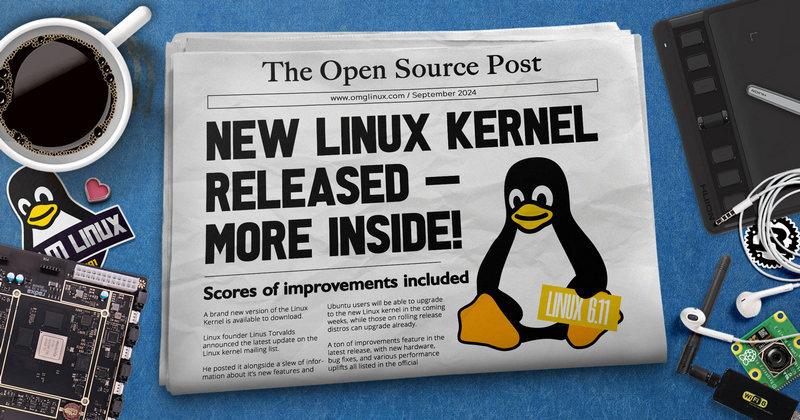 Linus Torvalds heeft versie 6.12 van de Linux Kernel vrijgegeven. De kernel is het hart van het besturingssysteem en zit, simpel gezegd, als laag tussen de hardware en de applicaties in. De nieuwe uitgave bevat de gebruikelijke hoeveelheid aan verbeteringen. Meer informatie kan bij 9to5Linux en OMG Ubuntu worden gevonden.
Linus Torvalds heeft versie 6.12 van de Linux Kernel vrijgegeven. De kernel is het hart van het besturingssysteem en zit, simpel gezegd, als laag tussen de hardware en de applicaties in. De nieuwe uitgave bevat de gebruikelijke hoeveelheid aan verbeteringen. Meer informatie kan bij 9to5Linux en OMG Ubuntu worden gevonden.
Linux 6.12 ReleasedHighlights of Linux 6.12 include real-time “PREEMPT_RT” support, a new scheduler called sched_ext, DRM panic messages as QR codes, Clang support (including LTO) for nolibc, an updated cpuidle tool that now displays the residency value of cpuidle states for a clearer and more detailed view of idle state information when using cpuidle-info, and support for NVIDIA‘s virtual command queue implementation for SMMUv3.
Linux kernel 6.12 also introduces SWIG bindings for libcpupower to make it easier for developers to write scripts that use and extend the functionality of libcpupower, support for translating normalized error addresses reported by an AMD memory controller into system physical addresses using a UEFI mechanism called platform runtime mechanism (PRM), as well as simplified loading of microcode patches on AMD Zen and newer CPUs by using the family, model, and stepping encoded in the patch revision number.
RISC-V, a new thermal core testing module allowing mock thermal zones to be created and controlled via debugfs to exercise the thermal core functionality, and support for ARM’s “Permission Overlay Extension” using memory protection keys.
Moreover, Linux 6.12 adds support for running as a protected guest on Android as well as perf and support for a bunch of new interconnect PMUs. It also adds the final conversions to the new Intel VFM CPU model matching macros, rewrites the PCM buffer allocation handling and locking optimizations, and improves the USB audio driver.
The RISC-V architecture received support for using Zkr to seed KASLR, support for IPI-triggered CPU backtracking, support for generic CPU vulnerabilities reporting to userspace, support for tracing userspace stacks, and support for the Svvptc extension.
Some networking enhancements are included as well like Device Memory TCP support adding the ability to zero-copy receive TCP payloads to a DMABUF region of memory while packet headers land separately in normal kernel buffers, IPv6 IOAM6 support for new tunsrc encap mode, support for the IPv6 PIO p flag in the Prefix Information Option, and the ability to read the PTP PHC (Physical Hardware Clock) alongside MONOTONIC_RAW timestamps with PTP_SYS_OFFSET_EXTENDED.
Linux kernel 6.12 also brings support for continuous reads in the SPI-NAND subsystem, support for adding custom names to regmap irqdomains to allow for multiple interrupt controllers associated with a single struct device, support for configuring the state of the MOSI pin when the bus is idle, as well as ports of vDSO getrandom for the LoongArch64, ARM64 (AArch64), PowerPC, and s390x architectures.
On top of that, there are new and updated drivers for better hardware support with additions like i.MX95 NETCMIX support in the block control provider, new drivers for MSM8976 and MSM8937 platforms, a new LC824206XA micro USB switch driver, a new driver for the ON Semiconductor LC824206XA micro USB switch and accessory detector chip on Lenovo Yoga Tablet 2 Pro-1380, as well as hybrid CPU capacity scaling support in the intel_pstate driver.
There’s also support for Marvell xSPI, Mediatek MTK7981, Microchip PIC64GX, NXP i.MX8ULP, and Rockchip RK3576 controllers, a new driver for Realtek automotive PCIe devices (RTL9054, RTL9068, RTL9072, RTL9075, RTL9068, RTL9071), a new driver for Microchip LAN8650/1 10BASE-T1S MAC-PHY, support for RTL8126A rev.b, a new driver for the Rockchip RK3568 CAN-FD controller, and a new driver for the Sophgo SG2042 external hardware monitor.
The intel_idle driver now handles Granite Rapids Xeon processors natively, the intel_rapl power capping driver now recognizes family 1Ah of AMD processors and Intel ArrowLake-U chips, and the intel_pstate driver now handles Granite Rapids and Sierra Forest chips in the out-of-band (OOB) mode. In addition, Linux kernel 6.12 adds support for the PixArt PS/2 touchpad and support for RTL8852BT and 8852BE-VT (Wi-Fi 6).
The list of newly supported hardware continues with support for ARM64-based Surface devices, operation region support on LG laptops, support for changing battery charge settings on Dell laptops, support for fan profiles on ASUS Vivobook laptops, support for new hardware features like high-resolution wheel scrolling, touch strings with relative motions, and support for two touch rings in the Wacom driver, a new 9p network gadget, and Intel Xe2 graphics enabled by default for Lunar Lake and Battlemage processors.
Of course, Linux kernel 6.12 brings various improvements to the EXT4, Btrfs, exFAT, FUSE, F2FS, and Bcachefs filesystems, more Rust updates and support for the latest Rust releases, documentation improvements, clean-ups, and bug fixes.


:strip_exif()/i/1274122604.png?f=thumbmedium)